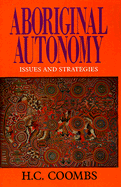Book contents
- Frontmatter
- Contents
- Foreword by Michael Dodson
- Preface
- Acknowledgments
- The Aboriginal World View
- Aborigines and the Land
- Aboriginal Lifestyles
- Aborigines, Resources and Development
- Aborigines, Law and the State
- Asserting Autonomy: Recent Aboriginal Initiatives
- 14 Aboriginal initiatives on the land
- 15 Initiatives in Aboriginal political organisation
- 16 Education: taking control
- The Recognition of Native Title
- Conclusion
- Appendix: The Eva Valley Statement
- References
- Select Bibliography of work by H.C. Coombs
- Index
15 - Initiatives in Aboriginal political organisation
Published online by Cambridge University Press: 03 May 2011
- Frontmatter
- Contents
- Foreword by Michael Dodson
- Preface
- Acknowledgments
- The Aboriginal World View
- Aborigines and the Land
- Aboriginal Lifestyles
- Aborigines, Resources and Development
- Aborigines, Law and the State
- Asserting Autonomy: Recent Aboriginal Initiatives
- 14 Aboriginal initiatives on the land
- 15 Initiatives in Aboriginal political organisation
- 16 Education: taking control
- The Recognition of Native Title
- Conclusion
- Appendix: The Eva Valley Statement
- References
- Select Bibliography of work by H.C. Coombs
- Index
Summary
SOME EARLY GOVERNMENT INITIATIVES
After the referendum of 1967 I was approached by the then Prime Minister, Harold Holt, for advice about an appropriate organisation to guide his government in the much neglected area of Aboriginal affairs. In relation to this new responsibility I recommended that the government should not rush a decision on this matter of organisation, but should initially appoint a small council supported by an office with a strong research basis, to study the nature of the problems it would face and advise the government in relation to policies and the administrative and executive means by which they might be carried out. My early contact with the administration of Aboriginal affairs in the Northern Territory and Queensland, in both of which the tendency for separatism and paternalistic dominance seemed strong, convinced me that unless the council and office were free of executive responsibility they could not avoid being identified with the status quo and would, as a consequence, be inhibited in the advocacy of change. I hoped the council could develop an independent but influential role, seeking to mould policy and administration widely by the quality of its research, knowledge of and links with Aborigines and by persuasiveness, rather than authority.
Accordingly, in September of 1967 the Council and the Office of Aboriginal Affairs were set up and I was appointed chairman.
- Type
- Chapter
- Information
- Aboriginal AutonomyIssues and Strategies, pp. 171 - 186Publisher: Cambridge University PressPrint publication year: 1994



